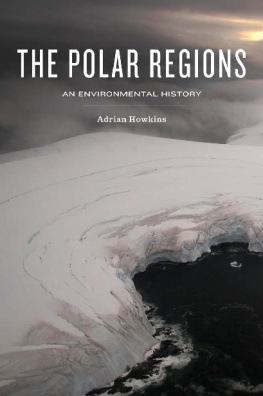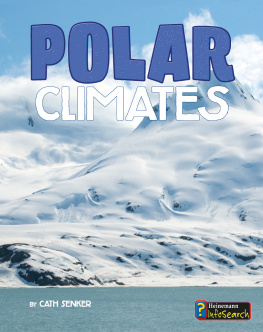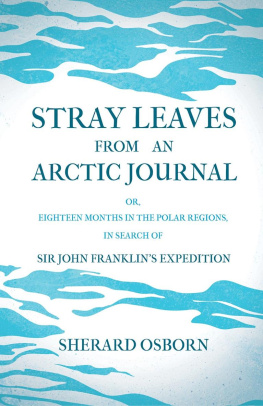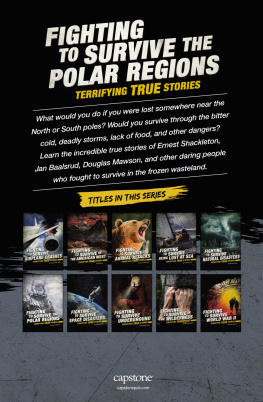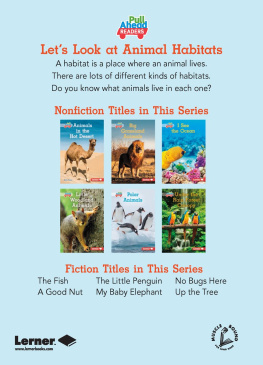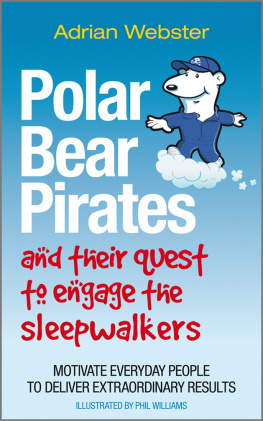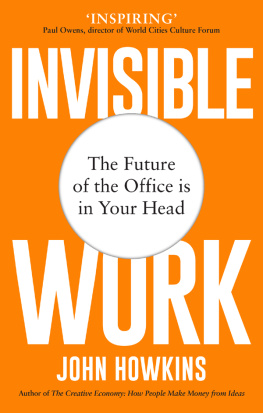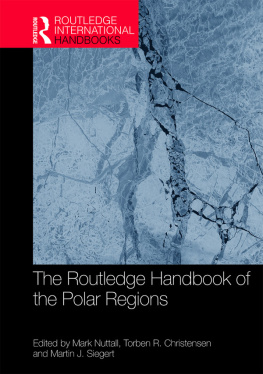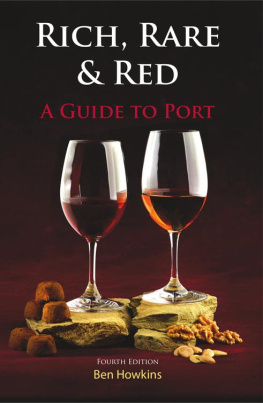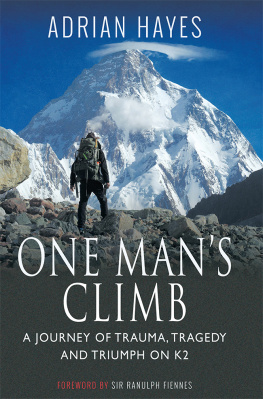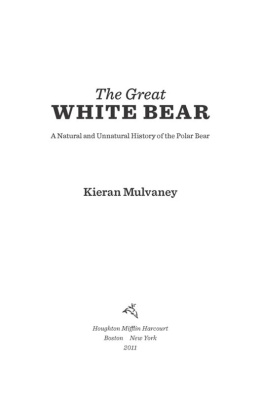Adrian Howkins - The Polar Regions: An Environmental History
Here you can read online Adrian Howkins - The Polar Regions: An Environmental History full text of the book (entire story) in english for free. Download pdf and epub, get meaning, cover and reviews about this ebook. year: 0, publisher: Wiley, genre: History. Description of the work, (preface) as well as reviews are available. Best literature library LitArk.com created for fans of good reading and offers a wide selection of genres:
Romance novel
Science fiction
Adventure
Detective
Science
History
Home and family
Prose
Art
Politics
Computer
Non-fiction
Religion
Business
Children
Humor
Choose a favorite category and find really read worthwhile books. Enjoy immersion in the world of imagination, feel the emotions of the characters or learn something new for yourself, make an fascinating discovery.
- Book:The Polar Regions: An Environmental History
- Author:
- Publisher:Wiley
- Genre:
- Year:0
- Rating:4 / 5
- Favourites:Add to favourites
- Your mark:
- 80
- 1
- 2
- 3
- 4
- 5
The Polar Regions: An Environmental History: summary, description and annotation
We offer to read an annotation, description, summary or preface (depends on what the author of the book "The Polar Regions: An Environmental History" wrote himself). If you haven't found the necessary information about the book — write in the comments, we will try to find it.
The Polar Regions: An Environmental History — read online for free the complete book (whole text) full work
Below is the text of the book, divided by pages. System saving the place of the last page read, allows you to conveniently read the book "The Polar Regions: An Environmental History" online for free, without having to search again every time where you left off. Put a bookmark, and you can go to the page where you finished reading at any time.
Font size:
Interval:
Bookmark:
For Alison
ADRIAN HOWKINS
polity
Copyright Adrian Howkins 2016
The right of Adrian Howkins to be identified as Author of this Work has been asserted in accordance with the UK Copyright, Designs and Patents Act 1988.
First published in 2016 by Polity Press
Polity Press
65 Bridge Street
Cambridge CB2 1UR, UK
Polity Press
350 Main Street
Malden, MA 02148, USA
All rights reserved. Except for the quotation of short passages for the purpose of criticism and review, no part of this publication may be reproduced, stored in a retrieval system, or transmitted, in any form or by any means, electronic, mechanical, photocopying, recording or otherwise, without the prior permission of the publisher.
ISBN-13: 978-1-5095-0200-4
A catalogue record for this book is available from the British Library. Library of Congress Cataloging-in-Publication Data
Howkins, Adrian.
The polar regions : an environmental history / Adrian Howkins.
pages cm
Includes bibliographical references and index.
ISBN 978-0-7456-7080-5 (hardback)
1. Human ecology--Polar regions--History. 2. Polar regions--Environmental conditions. 3. Polar regions--Climate. I. Title.
G587.H69 2015
333.70911--dc23
2015013026
The publisher has used its best endeavors to ensure that the URLs for external websites referred to in this book are correct and active at the time of going to press. However, the publisher has no responsibility for the websites and can make no guarantee that a site will remain live or that the content is or will remain appropriate.
Every effort has been made to trace all copyright holders, but if any have been inadvertently overlooked the publisher will be pleased to include any necessary credits in any subsequent reprint or edition.
For further information on Polity, visit our website: politybooks.com
My academic interest in the Polar Regions began as a graduate student at the University of Texas. I would like to thank my doctoral supervisor Roger Louis, and my committee members Diana Davis, Bruce Hunt, Jonathan Brown, and Tony Hopkins, for their teaching, support, and for their willingness to supervise a dissertation on the history of Antarctica. In Austin it was a great pleasure to be part of an intellectually stimulating graduate student cohort that included Pablo Mijangos, Cory Conover, Chris Albi, Heather Peterson, Jos Barragn, Brandon Marsh, Mike Anderson, and many other wonderful friends and colleagues. Texas might not be the most obvious place to start writing about the history of the Polar Regions, but I like to think that there are a number of overlaps with the it aint braggin if its true mentality of Americas second largest state.
At Colorado State University my interest in the environmental history of extreme environments has developed in a vibrant intellectual atmosphere. I am particularly grateful to my friends and colleagues at the Public Lands History Center, who have encouraged me to think about history in a way that is fundamentally collaborative and engaged with wider publics. Mark Fiege has taught me more than he can know about being an environmental historian, and has offered constant support and encouragement with this project. Jared Orsi has been extremely generous in reading my work, offering insights with an uncanny ability to say the right thing at the right time. Ruth Alexander, Janet Ore, Sarah Payne, and Maren Bzdek have each done much to broaden my appreciation and understanding of the field of history. I would also like to thank the other members of the CSU History Department, especially my two departmental chairs, Doug Yarrington and Diane Margolf, who have been patient and supportive of my frequent requests to travel to distant places. The CSU History Department and College of Liberal Arts have both been generous in providing financial support for my research. In my classes I have learned as much from my students as they have learned from me, and I would like to thank them all for tolerating my idiosyncratic interests and laughing at my attempted jokes.
In summer 2013 I received a McColl Fellowship from the American Geographical Society Library in Milwaukee to conduct research for this project. Marcy Bidney, Jovanka Ristic, Susan Peschel, and Robert Jaeger made this one of the most productive and enjoyable research experiences of my career. I have also benefitted from the assistance of many other archivists and librarians at institutions around the world, including the University of Alaska Anchorage; the University of Alaska Fairbanks; the Byrd Polar Research Center; the US National Archives at College Park, Maryland; the Denver Public Library; the British Antarctic Survey; the Scott Polar Research Institute; the British National Archives; the Argentine Foreign Ministry Archive; the Argentine Antarctic Institute; the Chilean Foreign Ministry Archive; the National Library of Australia; the Australian Antarctic Division; the University of Waikato; the Victoria University of Wellington; Gateway Antarctica at the University of Canterbury; and the New Zealand National Archives in Wellington and Christchurch.
A few years ago, I wrote a short essay in the journal Environmental History titled Have You Been There? Some Thoughts On (Not) Visiting Antarctica in which I considered the importance environmental historians place on visiting the places we study. Since writing that essay I have had several opportunities to visit the Polar Regions. I would like to thank Diana Galimberti and Mariano Curiel for giving me my first opportunity to travel to Antarctica as a history lecturer, guide, and Zodiac driver with the tourist company Antarctica XXI. I am extremely grateful to Diana Wall, for introducing me to the McMurdo Dry Valleys Long Term Ecological Research project in Antarctica. Visiting the Dry Valleys has been one of the highlights of my life, and I would like to thank Diane McKnight and everyone associated with the project for making me feel so welcome, as well as the National Science Foundations Office of Polar Programs for making this research possible (Grant ANT-1115245). In Alaskathe one state bigger than TexasDave Shaw was a fantastic guide on a trip I made to the Arctic National Wildlife Refuge with the Arctic Wild Company. My friends Sam and Tasha Caughey, Lars Mjaerfoss, and Pia Veldt Larsen have accompanied me on trips to Arctic Norway. It has been a tremendous privilege to be able to visit some of the places I write about in this book, but I try to keep reminding myself of the many issues raised by the nagging question, Have you been there?
I made my first venture into comparative polar history with Brandon Luedkte, and I would like to thank him for encouraging me to start looking to the north as well as to the south. Klaus Dodds, Peder Roberts, Lize Mari van Der Watt, Mark Carey, Alessandro Antonello, Ron Doel, Jim Fleming, Anita Guerrini, Cornelia Ldecke, Daniela Liggett, Consuelo Len, Mauricio Jara, Andrs Zarankin, Ximena Senatore, Tom Griffiths, Graeme Wynn, Ryan Jones, Brett Bennett, Paul Sutter, Tina Adcock, and Nigel Milius have all been especially helpful in helping to lay the intellectual foundations for this book. At Polity Press I would like to thank Andrea Drugan and Elliott Karstadt for encouraging this project and being fantastic editors. The anonymous reviewers provided many useful ideas and suggestions. It is impossible to thank everyone by name for the conversations, shared ideas, research support, and general assistance that has been given to me as part of writing this book, but I am truly grateful to you all. Any errors of fact or interpretation are my responsibility alone.
Font size:
Interval:
Bookmark:
Similar books «The Polar Regions: An Environmental History»
Look at similar books to The Polar Regions: An Environmental History. We have selected literature similar in name and meaning in the hope of providing readers with more options to find new, interesting, not yet read works.
Discussion, reviews of the book The Polar Regions: An Environmental History and just readers' own opinions. Leave your comments, write what you think about the work, its meaning or the main characters. Specify what exactly you liked and what you didn't like, and why you think so.

